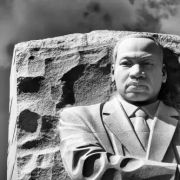Vote for Trump and Vance and Go to Hell!
By Brian Figeroux, Esq. | Photo credit: A.I Photo
Consider the Consequences: Is Voting for Trump and Vance Truly Worth It? Read Your Bible, Fellow Americans!
In 2024, the political landscape in the United States, especially surrounding the presidential candidacy of Donald Trump and his running mate JD Vance, has generated significant debate and controversy. Both figures have made public remarks and promoted rhetoric that some have interpreted as racially charged or even explicitly racist. This has raised a moral and spiritual dilemma for Christian voters in America, who must consider whether voting for this ticket aligns with their faith and biblical teachings. Read more at www.askthelawyer.us. To read the complete analysis in our publication, click here, and on our civil rights blog, click here.
This analysis explores whether Christians, based on biblical principles and teachings, should vote for the Trump-Vance team in the 2024 presidential election. We will examine both sides of the argument, using biblical scripture to address the potential moral implications of supporting candidates whose rhetoric has stirred racial tensions. Key biblical themes such as justice, love for one’s neighbor, the rejection of partiality, and truthfulness will guide this discussion.
The Christian Responsibility in Voting
Before delving into the specific concerns around the Trump-Vance candidacy, it’s important to establish the broader Christian responsibility when it comes to voting. Christians are called to engage in the world in ways that reflect Christ’s teachings. This includes participating in civic duties such as voting, with the understanding that their choices should honor God and promote justice, righteousness, and love.
- Romans 13:1-7 teaches that governing authorities are established by God and that Christians are to respect and participate in civil government. However, they are also called to discern when these authorities act contrary to God’s will.
- Micah 6:8 lays out a Christian’s responsibility in public life: “He has shown you, O mortal, what is good. And what does the Lord require of you? To act justly and to love mercy and to walk humbly with your God.”
These scriptures provide a framework for evaluating political candidates: Christians are called to pursue justice, mercy, and humility, especially when making decisions that impact their communities and the broader society.
Assessing the Racially Charged Rhetoric of Trump and Vance
- Racially Charged Statements and Their Impact
One of the key controversies surrounding Donald Trump’s political career has been his use of language that many perceive as racially divisive. Examples include his statements regarding Mexican immigrants, whom he referred to as “rapists” and criminals, and his comments about banning Muslims from entering the U.S. These statements, combined with his failure to unequivocally condemn white supremacist groups like the Proud Boys, have led many to accuse Trump of promoting racism and xenophobia.
JD Vance, Trump’s running mate, has also attracted controversy for his defense of Trump’s rhetoric and for promoting conspiracy theories that disparage immigrants, such as suggesting that immigrants are responsible for eating pets in Ohio. These statements have been widely debunked but continue to fuel negative stereotypes about minority groups.
- Biblical Teaching on Racism and Partiality
The Bible unequivocally condemns racism and shows that God’s people are called to reject all forms of partiality based on race or ethnicity.
- Galatians 3:28: “There is neither Jew nor Gentile, neither slave nor free, nor is there male and female, for you are all one in Christ Jesus.” This verse emphasizes the unity of all people in Christ and the elimination of ethnic and social divisions within the Christian community.
- James 2:1 warns against showing favoritism, stating: “My brothers and sisters, believers in our glorious Lord Jesus Christ must not show favoritism.” This can be understood as a call to reject racial or ethnic discrimination, as Christians are called to treat all people equally in love and fairness.
Trump and Vance’s rhetoric, particularly as it relates to race and immigration, seems to conflict with these biblical teachings. The Bible calls Christians to love their neighbors (Matthew 22:39) and to welcome strangers (Leviticus 19:34), yet the political messaging of this team often leans on fear, exclusion, and division.
- Love for Neighbor and the Immigrant
The Bible contains numerous teachings about how Christians should treat their neighbors and, more specifically, immigrants and strangers in their land. These teachings emphasize compassion, care, and fairness, which stand in stark contrast to the exclusionary rhetoric often associated with Trump and Vance.
- Leviticus 19:34: “The foreigner residing among you must be treated as your native-born. Love them as yourself, for you were foreigners in Egypt. I am the Lord your God.” This commandment underscores the biblical mandate to treat immigrants with dignity and respect, reminding the Israelites that they too were once foreigners.
- Matthew 25:35: “For I was hungry and you gave me something to eat, I was thirsty and you gave me something to drink, I was a stranger and you invited me in.” Jesus associates care for the marginalized, including strangers and immigrants, with care for Himself, reinforcing the Christian duty to extend love and hospitality to all people.
Given these biblical teachings, Christians may find it difficult to reconcile support for a political platform that frequently scapegoats immigrants and minorities with the call to love and care for the vulnerable.
Voting Based on Christian Values: A Closer Look
- The Call to Justice
The Bible calls Christians to seek justice in all areas of life, particularly for those who are oppressed and marginalized. This is a key consideration when evaluating any political candidate or platform.
- Isaiah 1:17: “Learn to do right; seek justice. Defend the oppressed. Take up the cause of the fatherless; plead the case of the widow.”
- Proverbs 31:8-9: “Speak up for those who cannot speak for themselves, for the rights of all who are destitute. Speak up and judge fairly; defend the rights of the poor and needy.”
In light of this, Christians must consider whether Trump and Vance’s policies and rhetoric align with the biblical mandate to defend the rights of the oppressed. Statements and policies that disproportionately target minority communities, particularly immigrants and people of color, raise serious concerns about whether voting for this team would promote justice or perpetuate injustice.
- Truthfulness in Leadership
Another important biblical value is truthfulness. Christians are called to speak the truth and avoid spreading falsehoods. In the political realm, this applies to evaluating candidates based on the honesty and integrity of their statements and policies.
- Ephesians 4:25: “Therefore, each of you must put off falsehood and speak truthfully to your neighbor, for we are all members of one body.”
- Proverbs 12:22: “The Lord detests lying lips, but he delights in people who are trustworthy.”
Both Trump and Vance have been criticized for spreading falsehoods, particularly in relation to issues of race and immigration. Trump’s continued promotion of the false narrative that immigrants are disproportionately responsible for crime in the U.S. and Vance’s promotion of debunked conspiracy theories contribute to a culture of fear and misinformation. For Christians who value truthfulness, these patterns of dishonesty may pose a significant ethical dilemma when considering whether to support this ticket.
- The Role of Leadership in Promoting Unity
Christians are called to be peacemakers and to promote unity within their communities. Political leaders have a significant role in either fostering division or promoting peace and reconciliation.
- Matthew 5:9: “Blessed are the peacemakers, for they will be called children of God.”
- Romans 12:18: “If it is possible, as far as it depends on you, live at peace with everyone.”
Trump’s presidency, and his campaign rhetoric leading into the 2024 election, has often been marked by divisiveness, particularly along racial and ethnic lines. His repeated attacks on minority groups and his failure to unequivocally condemn white supremacist movements have contributed to an environment of heightened racial tension. For Christians committed to peace and unity, this divisiveness may be deeply concerning and may lead them to reconsider their support for this team.
Arguments in Favor of Voting for Trump and Vance
While many of Trump and Vance’s statements may conflict with certain biblical values, some Christian voters may argue in favor of supporting this team based on other aspects of their platform, such as their stances on religious freedom, abortion, and traditional family values.
- Defense of Religious Freedom
Many Christians see Trump and Vance as defenders of religious freedom, particularly in the context of cultural shifts that they perceive as threatening to Christian values. Trump’s appointment of conservative judges and his vocal support for religious liberties, such as the right to publicly express religious beliefs and oppose government mandates that conflict with personal faith, resonate with many Christian voters.
- 2 Timothy 3:12: “In fact, everyone who wants to live a godly life in Christ Jesus will be persecuted.”
- Acts 5:29: “Peter and the other apostles replied: ‘We must obey God rather than human beings!’”
For Christians who prioritize religious freedom, the Trump-Vance ticket may seem like the best choice to protect their right to live out their faith in public life.
- Anti-Abortion Stance
Another key issue for many Christian voters is the candidates’ stance on abortion. Trump and Vance are staunchly anti-abortion, with both having made significant promises to continue fighting for pro-life policies, including appointing conservative judges who may overturn or limit access to abortion.
- Psalm 139:13-16: “For you created my inmost being; you knit me together in my mother’s womb.”
- Jeremiah 1:5: “Before I formed you in the womb I knew you, before you were born I set you apart.”
For Christians who see the issue of abortion as the most critical moralstances that Christian voters prioritize, Trump and Vance’s position on abortion can be a major factor in deciding their support. The biblical references to the sanctity of life resonate deeply with Christian voters who view the protection of unborn children as paramount. For these Christians, the racial rhetoric of Trump and Vance may be viewed as secondary to the larger issue of abortion, which they see as a fundamental moral concern.
- Economic Policies and Stewardship
Another potential argument in favor of voting for Trump and Vance revolves around their economic policies. Many Christian voters believe in the importance of economic stewardship, and they may view Trump and Vance’s economic platform as better aligned with principles of personal responsibility and free market economics. Trump has often emphasized economic growth, reduced regulations, and lower taxes as key achievements of his administration, which he claims benefited both businesses and individuals.
- Proverbs 13:22: “A good person leaves an inheritance for their children’s children, but a sinner’s wealth is stored up for the righteous.”
- Matthew 25:14-30: The Parable of the Talents speaks to the importance of stewardship and wise management of resources.
For Christians who prioritize economic stability and growth, Trump and Vance may be seen as strong candidates who will protect their financial interests and those of future generations.
Challenges for Christians Supporting Trump and Vance
While the issues of religious freedom, abortion, and economic policy are important to many Christians, the racially charged rhetoric of Trump and Vance presents significant moral challenges for those who take seriously the Bible’s teachings on justice, truth, and love for one’s neighbor.
- The Danger of Overlooking Racism
One of the greatest dangers for Christians supporting Trump and Vance is the temptation to overlook or excuse racial injustice for the sake of other policy issues. The Bible repeatedly calls God’s people to stand against oppression and to care for the marginalized.
- Isaiah 58:6-7: “Is not this the kind of fasting I have chosen: to loose the chains of injustice and untie the cords of the yoke, to set the oppressed free and break every yoke? Is it not to share your food with the hungry and to provide the poor wanderer with shelter—when you see the naked, to clothe them, and not to turn away from your own flesh and blood?”
This passage from Isaiah emphasizes the importance of addressing injustice, which includes racial and ethnic oppression. Christians who choose to support a political team that perpetuates racially charged rhetoric may need to grapple with the potential consequences of ignoring the Bible’s call to justice in favor of other political priorities.
- The Risk of Division
Trump and Vance’s rhetoric has been divisive, particularly when it comes to issues of race, immigration, and crime. This divisiveness runs counter to the Bible’s call for unity and peace within the Christian community and society at large.
- Ephesians 4:3: “Make every effort to keep the unity of the Spirit through the bond of peace.”
- John 17:20-23: Jesus prays for unity among His followers, stating that this unity will be a testimony to the world of God’s love.
Supporting candidates who sow division along racial and ethnic lines risks undermining the unity that Christ calls Christians to pursue. While policy disagreements are inevitable in politics, the Bible warns against promoting leaders who actively divide communities and foster animosity between different groups.
- The Testimony of the Church
The public witness of the Christian Church is another significant consideration for Christian voters. Supporting a political team that engages in racially charged rhetoric could harm the Church’s reputation and weaken its ability to be a witness for Christ in the broader culture.
- Matthew 5:16: “In the same way, let your light shine before others, that they may see your good deeds and glorify your Father in heaven.”
- 1 Peter 2:12: “Live such good lives among the pagans that, though they accuse you of doing wrong, they may see your good deeds and glorify God on the day he visits us.”
The Church is called to be a light in the world, demonstrating God’s love, justice, and righteousness. Christians who align themselves with leaders whose rhetoric is perceived as racist or divisive risk damaging their ability to be effective witnesses for the Gospel.
Conclusion: A Biblical Framework for Voting
In conclusion, the decision of whether Christians in America should vote for Donald Trump and JD Vance in the 2024 presidential election requires careful consideration of several key biblical principles. On the one hand, Trump and Vance’s stance on issues such as religious freedom, abortion, and economic policy may resonate with many Christian voters who see these as fundamental moral concerns. However, the racially charged rhetoric and divisive language that has characterized much of their political discourse presents a serious challenge for Christians who seek to follow the Bible’s teachings on justice, truth, and love for neighbor.
The Bible calls Christians to pursue justice, defend the oppressed, love their neighbors (including immigrants and the marginalized), and speak the truth in love. While no political candidate or party perfectly aligns with biblical values, Christians are called to vote in a way that reflects their commitment to these principles.
Ultimately, each Christian must prayerfully discern how their vote can best honor God and promote the common good. For some, this may mean prioritizing issues like abortion or religious freedom; for others, it may mean refusing to support candidates whose rhetoric and policies promote division, fear, and racial injustice. In either case, Christians are called to vote with a clear conscience, seeking to glorify God in all they do, including their participation in the political process.












Leave a Reply
Want to join the discussion?Feel free to contribute!